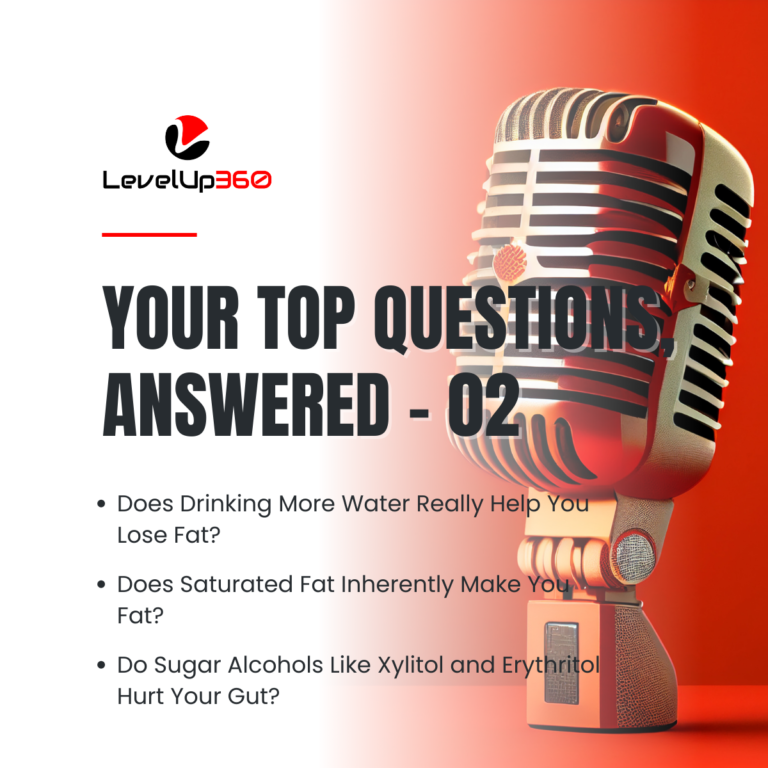
Your Top Health and Fitness Questions, Answered:
- Does Drinking More Water Really Help You Lose Fat?
- Does Saturated Fat Inherently Make You Fat?
- Do Sugar Alcohols Like Xylitol and Erythritol Hurt Your Gut
In this Q&A article, we tackle some hotly debated nutrition topics by analysing the latest scientific research and translating it into straightforward, practical advice you can implement in your own life. Read on for science-backed answers addressing the effects of water on fat loss, the truth about saturated fat and body composition, and impacts of sugar alcohol sweeteners on digestion.
Does Drinking More Water Really Help You Lose Fat?
Question
I often see “drink more water” on lists of weight loss tips. Does consuming more water really help people lose fat, or is this just a myth?
Answer
This is an excellent question. The rationale behind this popular weight loss advice is that drinking more water may reduce hunger by filling up the stomach. Some also claim that being better hydrated decreases the likelihood of eating more calories than needed by preventing thirst from being confused with hunger.
However, a recent meta-analysis puts this common weight loss tip to the test and finds that drinking more water on its own has negligible effects on measures of adiposity.
The analysis combined data from 8 rigorous randomised controlled trials including over 1000 overweight or obese adults. The studies tested interventions ranging from having participants drink an extra 1-2 litters of water per day to substituting water for other beverages.
The meta-analysis found no significant impact of increased water intake on body weight, BMI, or waist circumference. The effects were trivial, with differences of less than 1 cm between water intervention and control groups.
Interestingly, one notable finding was that replacing sugar-sweetened beverages with water may slightly reduce waist circumference. This is likely due to decreasing liquid calorie intake from sugary drinks.
However, the analysis also found that replacing diet beverages with water surprisingly may increase adiposity. This suggests artificially sweetened drinks may satisfy a sweet craving and reduce calories elsewhere in the diet. When water replaces them, people may eat more sugary foods to compensate. But more studies are needed to confirm this.
Bottom line
Drinking more water itself appears very unlikely to lead to meaningful weight loss for most people based on this meta-analysis. However, it remains important for health to meet daily fluid needs, which for adults averages around 2-4 litters from food and beverages combined. Simply replacing sugary drinks with water or a mix of water and diet drinks remains a smart weight management strategy by reducing liquid calories. But plain water consumption doesn’t seem to provide any unique benefits for fat loss compared to other unsweetened options.
Does Saturated Fat Inherently Make You Fat?
Question
I’ve heard saturated fat directly causes more body fat than unsaturated fat sources like vegetable oils. Is this true?
Answer
This is a hotly debated nutrition topic. Conventional wisdom has vilified saturated fat as a major culprit behind rising obesity and heart disease rates since the 1950s, leading to longstanding recommendations to reduce saturated fat intake.
However, with the recent popularity of higher fat and carnivore diets, some studies suggest diets higher in saturated fat may not increase body fat more than unsaturated fat when calories are matched. But the evidence remains mixed.
For example, one controlled feeding trial compared the effects of overeating muffins high in saturated fat versus polyunsaturated fat in 39 adults over 7 weeks. The saturated fat group gained slightly more body fat.
But a follow-up study with a larger sample of 61 adults failed to replicate this finding. Over 8 weeks of overfeeding, there were nearly identical changes in body composition between the high saturated and unsaturated fat groups.
Observational data also doesn’t show clear relationships between types of fat and body fat when accounting for overall calorie intake.
This indicates saturated fat may not inherently “fatten” people more than unsaturated fat, at least not by any major magnitude. Overeating any type of fat can contribute to weight gain.
However, there are good reasons to limit saturated fat for heart health. Strong evidence links high saturated fat intake to increased heart disease risk factors like LDL cholesterol compared to unsaturated fats.
But the effects of specific fatty acids differ. For example, lauric and myristic acid (in coconut oil) may raise LDL more than palmitic acid (in palm oil).
Bottom line
Overall, restricting saturated fat intake to <10% of total calories, or about 22 grams on a 2000 calorie diet, remains prudent for long-term heart health based on the established links between saturated fat and blood lipids. But saturation alone does not appear to dramatically impact body composition if calories are controlled. A balanced approach to fat intake is key.
Do Sugar Alcohols Like Xylitol and Erythritol Hurt Your Gut?
Question
I often enjoy sugar-free protein bars and gum, but I’ve heard sugar alcohols like xylitol and erythritol might have negative effects on gut health. Should I be concerned?
Answer
This is an understandable concern, but the impact of sugar alcohols on gut health is highly variable between different types of sugar alcohols and between different people.
Some sugar alcohols like xylitol and erythritol are generally well tolerated, while others like maltitol are more likely to cause gastrointestinal issues like bloating and diarrhoea when over-consumed.
Here’s why: The unabsorbed portion of sugar alcohols reaches the colon where gut bacteria ferment them, producing gas and beneficial short-chain fatty acids. But if they aren’t properly fermented, osmotic diarrhoea can occur.
So someone’s individual tolerance depends on the specific sugar alcohol, the dose consumed, and their personal gut microbiome’s unique ability to break it down.
For instance, a dose of xylitol or erythritol that causes problems for one person might be just fine for someone else. And consistent intake of a problematic sugar alcohol can potentially increase tolerance over time as the gut microbiome adapts.
Research shows that specific gut bacteria are responsible for metabolising different sugar alcohols. The gut microbiome varies dramatically between individuals, which likely explains the high degree of variability in response.
There’s also evidence that consistent intake of certain sugar alcohols may have a prebiotic effect, increasing the abundance of bacteria capable of fermenting that sugar alcohol. This adaptation can improve tolerance over time.
Bottom line
While negative effects can occur if overdone, sugar alcohols aren’t necessarily bad for your gut. Start slow and pay attention to your individual response. Over time, moderation and variety can help build your tolerance. And remember, your gut microbiome is malleable!
Recommended reading
Recommended reading
Additional Resources
Feeling in control of your health
If you are interested in improving your health and wellness, check out other resources such as Our Blog, Free Resources and/or join our private Body-Mind Transformation Secrets Community on Facebook, and go on an even deeper dive with me to uncover how to succeed in your health and wellness goals.
You may also be interested in our Sleep Secrets Cheat Sheet. It is a great resource with strategies to fix and optimize your sleep which is crucial to succeeding in your health and wellness goals.
Resources
Pictures








